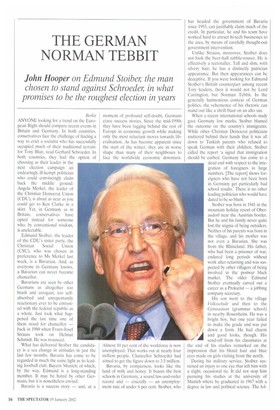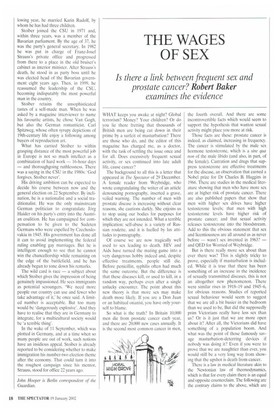THE GERMAN NORMAN TEBBIT
John Hooper on Edmund Stoiber, the man
chosen to stand against Schroeder, in what promises to be the roughest election in years
Berlin ANYONE looking for a trend on the European Right should compare recent events in Britain and Germany. In both countries, conservatives face the challenge of finding a way to evict a socialist who has successfully occupied much of their traditional terrain: for Tony Blair, read Gerhard Schroeder. In both countries, they had the option of choosing as their leader in the next election campaign an endearingly ill-kempt politician who could convincingly claim back the middle ground: Angela Merkel, the leader of the Christian Democrat Union (CD U), is about as near as you could get to Ken Clarke in a skirt. Yet, in Germany as in Britain, conservatives have opted instead for someone who, by conventional wisdom, is unelectable.
Edmund Stoibcr, the leader of the CDU's sister party, the Christian Social Union (CSU), who was chosen in preference to Ms Merkel last week, is a Bavarian. And, as everyone in Germany knows. a Bavarian can never become chancellor.
Bavarians are seen by other Germans as altogether too brash and arrogant, too selfabsorbed and unrepentantly reactionary ever to be entrusted with the federal republic as a whole. Just look what happened the last time one of them stood for chancellor — back in 1980 when Franz-Josef Strauss took on Helmut Schmidt. He was trounced.
What has delivered Stoiber the candidacy is a sea change in attitudes in just the last few months. Bavaria has come to be regarded in much the same light as its leading football club, Bayern Munich; of which, by the way, Edmund is a long-standing member. It may be hated by other Germans, but it is nonetheless envied.
Bavaria is a success story — and, at a moment of profound self-doubt, Germans crave success stories. Since the mid-1990s they have been lagging behind the rest of Europe in economic growth while making only the most reluctant moves towards liberalisation. As has become apparent since the start of the winter, they are in worse shape than many of their neighbours to face the worldwide economic downturn.
Almost 10 per cent of the workforce is now unemployed. That works out at nearly four million people. Chancellor Schroeder had aimed to get the figure down to 3.5 million.
Bavaria, by comparison, looks like the land of milk and honey. It boasts the best schools in Germany, a sound law-and-order record and — crucially — an unemployment rate of under 6 per cent. Stoiber, who has headed the government of Bavaria since 1993, can justifiably claim much of the credit. In particular, he and his team have worked hard to attract hi-tech businesses to the area, by means of carefully thought-out government intervention.
Unlike Strauss, moreover, Stoiber does not look the beer-hall rabble-rouser. He is effectively a teetotaller. Tall and slim, with silvery hair, he has a distinctly patrician appearance. But then appearances can be deceptive. If you were looking for Edmund Stoiber's British counterpart among recent Tory leaders, then it would not be Lord Carrington, but Norman Tebbit. In the generally harmonious context of German politics, the vehemence of his rhetoric can stand out like a shrill blast on an alto sax.
When a recent international schools study gave Germany low marks, Stoiber blamed the outcome on the country's immigrants. While other Christian Democrat politicians muttered behind their hands that it was all down to Turkish parents who refused to speak German with their children, Stoiber called the report 'a signal that immigration should be curbed. Germany has come to a dead end with respect to the integration of foreigners in large numbers. [The report] shows foreigners who have not been born in Germany get particularly bad school results.' There is no other leading politician who would have dared to be so blunt.
Stoiber was born in 1941 in the mountain holiday resort of Oberaudorf near the Austrian border. But he and his family never quite lost the stigma of being outsiders. Neither of his parents was born in the village, and his mother was not even a Bavarian. She was from the Rhineland. His father, who had been a prisoner of war, endured long periods without work after returning and was suspected by other villagers of being involved in the postwar black market. The older Edmund Stoiber eventually carved out a career as a Prokurist — a jobbing company secretary.
His son went to the village Volksschule and then to the Gymnasium (grammar school) in nearby Rosenheim. He was a bright boy, but one year failed to make the grade and was put down a form. He had charm and good looks, though. His send-off from his classmates at the end of his studies remarked on the impression that his blond hair and blue eyes made on girls visiting from the north.
During his military service, Stoiber sustained an injury to one eye that left him with a slight, occasional tic. It did not stop him pursuing his studies at the university of Munich where he graduated in 1967 with a degree in law and political science. The fol lowing year, he married Karin Rudolf, by whom he has had three children.
Stoiber joined the CSU in 1971 and, within three years, was a member of the Bavarian parliament. By the age of 37, he was the party's general secretary. In 1982 he was put in charge of Franz-Josef Strauss's private office and progressed from there to a place in the old bruiser's cabinet as interior minister. After Strauss's death, he stood in as party boss until he was elected head of the Bavarian government eight years ago. Then, in 1999, he reassumed the leadership of the CSU, becoming indisputably the most powerful man in the country.
Stoiber retains the unsophisticated tastes of a self-made man. When he was asked by a magazine interviewer to name his favourite artists, he chose Van Gogh, but also the German romanticist, Carl Spitzweg, whose often syrupy depictions of 19th-century life enjoy a following among buyers of reproduction art.
What has carried Stoiber to within grasping distance of the most powerful job in Europe is not so much intellect as a combination of hard work — 16-hour days — and thoroughgoing ruthlessness. There was a saying in the CSU in the 1980s: 'God forgives. Stoiber never'.
His driving ambition can be expected to decide his course between now and the general election on 22 September. By inclination, he is a nationalist and a social traditionalist. He was the only mainstream German politician to congratulate Jorg Haider on his party's entry into the Austrian coalition. He has campaigned for compensation to be given to the Sudeten Germans who were expelled by Czechoslovakia in 1945. His government has done all it can to avoid implementing the federal ruling enabling gay marriages. But he is intelligent enough to see that he cannot win the chancellorship while remaining on the edge of the battlefield, and he has already begun to tone down his remarks.
The wild card is race — a subject about which Stoiber gives the impression of being genuinely impassioned. He sees immigrants as potential scroungers. 'We need more people our country can use and fewer who take advantage of it,' he once said. A limited number is acceptable. But too many would be 'dangerously explosive'. And they have to realise that they are in Germany to integrate, for a multicultural society would be 'a terrible thing'.
In the wake of 11 September, which was plotted in Germany, and at a time when so many people are out of work, such notions have an insidious appeal. Stoiber is already reported to be considering whether to make immigration his number-two election theme after the economy. That could turn it into the roughest campaign since his mentor, Strauss, stood for office 22 years ago.































































 Previous page
Previous page